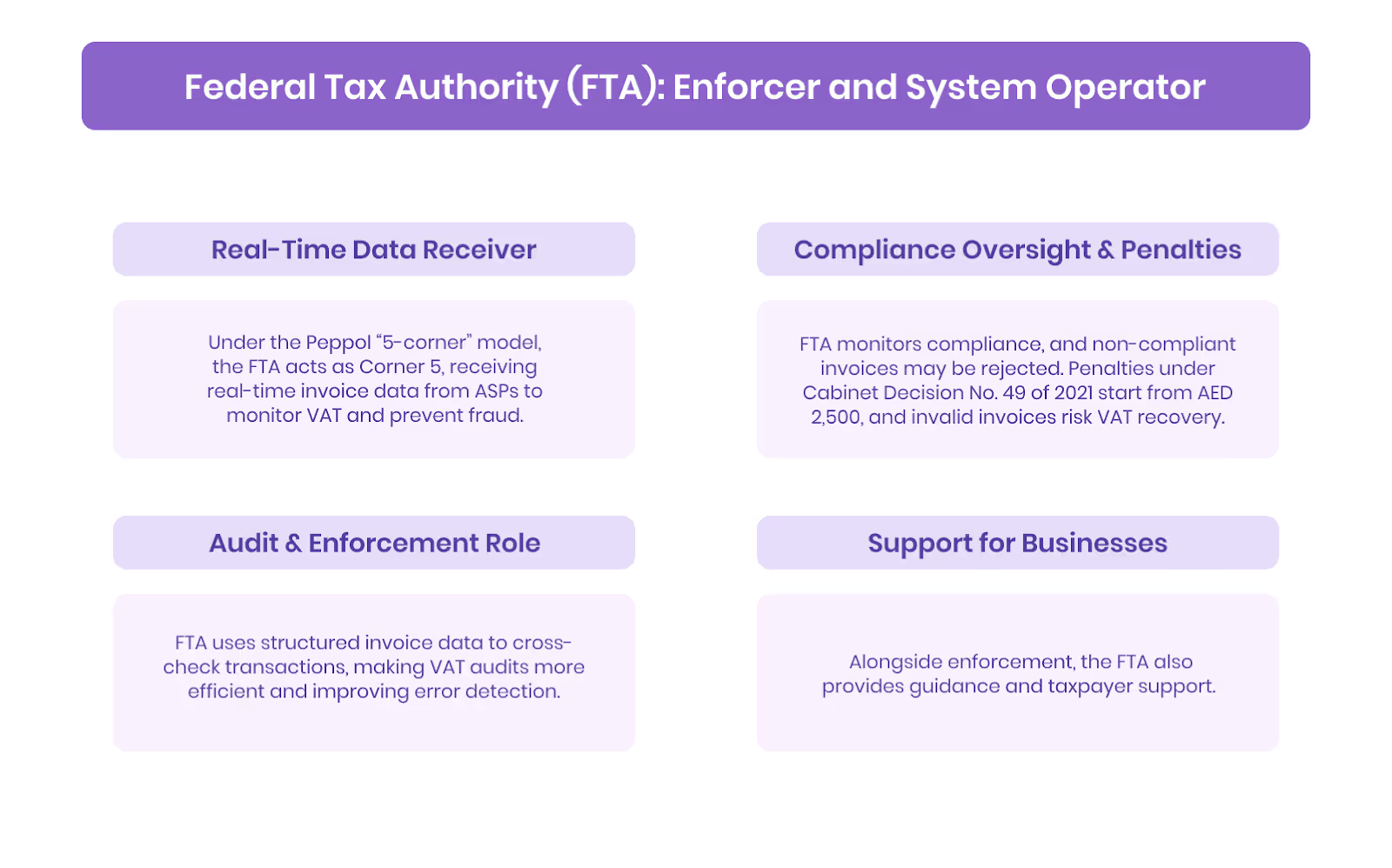The UAE’s e-invoicing mandate, set for full enforcement in July 2026, is not just a technical upgrade — it’s the creation of a new digital compliance ecosystem. At the center are government authorities, technology providers, and businesses, each with clearly defined responsibilities. Understanding this landscape is critical for companies to navigate compliance confidently, choose the right partners, and access the right support channels.
In this blog, we’ll break down who’s who in the UAE e-invoicing ecosystem: from policymakers at the Ministry of Finance (MoF), to the Federal Tax Authority (FTA) as the enforcer, to Accredited Service Providers (ASPs) acting as compliance intermediaries, and finally the businesses who will issue and receive invoices.
Ministry of Finance (MoF): Policy Driver and Peppol Authority
The Ministry of Finance (MoF) is the policy architect of the UAE’s e-invoicing system. Its role goes beyond issuing regulations — it sets the strategic direction of the entire program.
- Rulemaking & Oversight
The MoF is responsible for issuing the laws and ministerial decisions that establish the legal and technical framework for e-invoicing. For example, Federal Decree-Law No. 16 of 2024 amended the VAT law to recognize electronic invoices, while subsequent ministerial decisions define accreditation rules for service providers.
(Official reference: MoF Consultation Paper, 2025)
- Accreditation of Providers
The MoF manages the process of accrediting Authorized Service Providers (ASPs). Only these providers are allowed to transmit e-invoices to buyers and to the FTA. The official list of accredited ASPs will be published and regularly updated on the MoF portal. - Peppol Authority in the UAE
Importantly, the MoF serves as the UAE Peppol Authority, ensuring the local adoption of the Peppol PINT AE standard aligns with global interoperability rules. This means UAE businesses will be able to connect seamlessly to other Peppol jurisdictions, such as in Europe and Asia. - Public Guidance
The MoF maintains the official e-invoicing portal, which hosts key documents, FAQs, and updates. This is the authoritative source of information for businesses preparing for compliance.
Key takeaway: The MoF sets the rules, defines the technical standards, and acts as the steward of the UAE’s alignment with global e-invoicing frameworks.
Federal Tax Authority (FTA): Enforcer and System Operator

If the MoF sets the rules, the Federal Tax Authority (FTA) ensures they are followed. The FTA is the implementer and enforcer of e-invoicing in the UAE.
- Real-Time Data Receiver
Under the Peppol “5-corner” model, the FTA plays the role of Corner 5 — receiving invoice tax data in near real time via Accredited Service Providers (ASPs). This allows the authority to monitor VAT transactions as they happen, reducing risks of fraud or non-compliance.
(Source: MoF Consultation Paper, 2025)
- Compliance Oversight & Penalties
The FTA will be responsible for monitoring compliance. Non-compliant invoices (e.g., missing TRNs, invalid formats, or late reporting) may be rejected, and businesses can face fines under Cabinet Decision No. 49 of 2021 (penalties ranging from AED 2,500 upwards). Beyond financial penalties, invoices that fail to meet requirements may be considered invalid for VAT recovery, creating significant business risk. - Audit & Enforcement Role
By collecting structured invoice data, the FTA can cross-check transactions reported by suppliers and buyers. This makes VAT audits more efficient and increases the likelihood of detecting mismatches or errors. - Support for Businesses
Alongside enforcement, the FTA also provides guidance and taxpayer support. This includes:- Official publications and FAQs,
- Access to the FTA VAT guidance portal,
- Call centers and possibly training webinars to assist businesses transitioning into the new system.
Key takeaway: The FTA ensures compliance, operates the digital backend that receives invoice data, and provides businesses with the support needed to meet their obligations.
Accredited Service Providers (ASPs): The Compliance Gatekeepers
A central pillar of the UAE’s e-invoicing ecosystem is the Accredited Service Provider (ASP). These are third-party technology firms — and in rare cases, large enterprises with in-house capability — that act as the official intermediaries between businesses, their trading partners, and the FTA.
What ASPs Do
An ASP ensures that every e-invoice complies with the UAE’s Peppol PINT AE standard and reaches both the buyer and the FTA. Their main functions include:
- Validation: Checking that invoices contain all required fields (supplier TRN, VAT details, invoice references, etc.) and conform to the XML schema.
- Transformation: Converting internal ERP invoice data into the compliant PINT AE XML format.
- Transmission: Delivering the invoice to the buyer’s ASP and submitting the tax subset of data to the FTA simultaneously.
- Acknowledgment: Providing status messages back to suppliers and buyers (e.g., invoice accepted, rejected, or pending).
Why Businesses Must Use ASPs
From July 2026, VAT-registered companies will no longer be able to issue invoices via email or PDF attachments alone. Instead, invoices must flow through an ASP. This makes ASPs the gatekeepers of compliance: without them, businesses cannot meet the e-invoicing mandate.
Who the ASPs Are
The Ministry of Finance (MoF) oversees ASP accreditation and publishes the official list on its e-invoicing portal. Criteria for accreditation include ISO certifications, Peppol conformance, and operational experience. As of August 2025, global providers such as Pagero, Thomson Reuters, and Comarch have signaled preparations for accreditation, while local technology firms are also entering the process.
Large Businesses as ASPs
In theory, large enterprises with high invoice volumes could apply to become ASPs themselves — provided they meet all accreditation requirements. However, this is expected to be rare due to cost, certification, and ongoing compliance obligations.
Key takeaway: ASPs are not optional. They are the only authorized channel for transmitting e-invoices in the UAE, making the choice of a reliable ASP a critical compliance decision for every business.
Businesses (Taxpayers): Issuers and Receivers of E-Invoices
Every VAT-registered business in the UAE is both a participant and a beneficiary of the e-invoicing system. Whether you are issuing invoices to customers or receiving them from suppliers, your compliance responsibilities are clearly defined.
Sellers: Issuing Invoices
- All VAT-registered businesses must issue invoices electronically via an Accredited Service Provider (ASP).
- The ASP ensures invoices are properly formatted, validated, and delivered both to the buyer and to the FTA.
- Paper or PDF invoices sent directly to customers will not be compliant once the mandate takes effect in July 2026.
Buyers: Receiving Invoices
- Buyers must also be onboarded with an ASP in order to receive invoices digitally.
- If a buyer is not yet registered with an ASP, interim processes may include receiving a copy via email, but the supplier’s ASP is still required to report the invoice to the FTA.
- Businesses are encouraged to coordinate with their trading partners well before the deadline to ensure smooth invoice exchange.
VAT Groups and Special Cases
- In VAT groups, each entity must connect to an ASP, but all invoices must reference the group’s TRN (Tax Registration Number) to ensure consistency in reporting.
- Special cases such as free zones or sector-specific entities may be addressed in future MoF/FTA updates, but unless explicitly exempted, companies should assume they are in scope.
Preparing for Compliance
Businesses should:
- Communicate with customers and suppliers about which ASP networks they are adopting.
- Update master data (TRNs, VAT codes, customer details) to avoid errors.
- Train finance teams on monitoring e-invoice status and resolving rejections quickly.
Key takeaway: Compliance is not just about issuing invoices correctly — it also depends on coordination between buyers and sellers. Both sides of a transaction need to be ready for digital invoicing.
Technology Partners and Consultants: Enablers of Adoption
Beyond government bodies, service providers, and taxpayers, a broader network of technology partners and consultants plays a vital role in ensuring smooth adoption of e-invoicing across the UAE.
ERP Vendors and Software Providers
Global ERP platforms such as SAP, Oracle, and Microsoft Dynamics are already rolling out e-invoicing modules or connectors that integrate directly with Accredited Service Providers (ASPs). Local accounting solutions and cloud platforms are also expected to offer plug-and-play compliance features tailored for SMEs. Checking with your ERP or accounting vendor for a compliant e-invoice module should be one of the first steps in your readiness plan.
[cta-9]
Implementation Consultants
For larger or more complex businesses, consulting firms and system integrators provide critical support:
- Readiness Assessments: Evaluating existing invoicing processes against the requirements of the UAE’s PINT AE standard.
- Integration Support: Building connectors between internal ERP systems and ASP platforms.
- Change Management: Training staff and updating workflows to ensure smooth adoption.
Leading advisory firms such as PwC, Deloitte, and Baker McKenzie have published consultation papers and offer dedicated advisory services for UAE e-invoicing (Official reference: PwC UAE, 2025).
Why They Matter
These partners are not regulators — but they are critical enablers. By providing technology, expertise, and guidance, they reduce the risk of non-compliance and help businesses achieve operational efficiency during the transition.
Partnering with the right ERP vendor or consultant can make the difference between a rushed, error-prone rollout and a seamless, compliant adoption of e-invoicing.
Support Channels: Where Businesses Can Get Help
Transitioning to e-invoicing is a major change, and the UAE government has emphasized that businesses will not be left on their own. Multiple support channels are available — from official portals to service provider helplines — to guide companies through the process.
Ministry of Finance (MoF) Support
The MoF is the policymaker and accreditation authority, and its e-invoicing portal hosts:
- Legal documents (laws, cabinet decisions, and ministerial decrees).
- The official list of Accredited Service Providers (ASPs).
- FAQs and updates on technical standards, such as the UAE’s adoption of Peppol PINT AE.
The MoF also publishes consultation papers and technical guides, which businesses and software vendors can rely on as authoritative references.
Federal Tax Authority (FTA) Support
The FTA manages enforcement and compliance. Its support channels include:
- The FTA VAT guidance portal with detailed compliance updates.
- A dedicated call center and taxpayer support lines (including a toll-free number for general VAT inquiries).
- Guidance notes, webinars, and administrative FAQs designed to help taxpayers adjust to the e-invoicing mandate.
ASP Customer Support
Every ASP will provide customer service to its clients. This typically covers:
- Technical troubleshooting (e.g., fixing XML errors or connectivity issues).
- Assistance with onboarding and integration.
- Ongoing updates when schema or compliance rules are revised.
Practical Tip
Use official government channels (MoF/FTA) for questions about regulations and penalties, and rely on your ASP’s helpdesk for technical queries. For complex integration or compliance questions, consulting firms can provide additional expertise.
Businesses have access to multiple levels of support — MoF for policy, FTA for compliance enforcement, and ASPs for day-to-day technical help. Leveraging these channels early will prevent delays and reduce compliance risks.
Key Takeaways: UAE E-Invoicing Ecosystem
- Ministry of Finance (MoF): Sets the rules, accredits providers, and serves as the UAE’s Peppol Authority.
- Federal Tax Authority (FTA): Enforces compliance, operates the backend system, and monitors VAT reporting in real time.
- Accredited Service Providers (ASPs): Authorized intermediaries that validate, format, and transmit invoices — the only compliant channel for B2B and B2G invoices.
- Businesses (Taxpayers): Must issue and receive invoices electronically via ASPs; VAT groups must align each entity with the group TRN.
- Technology Partners & Consultants: ERP vendors and advisors support businesses with modules, integrations, and readiness assessments.
- Support Channels: MoF and FTA provide regulatory guidance, while ASPs and consultants handle technical and operational support.
Together, these stakeholders form the ecosystem that will drive compliance by July 2026. Businesses that understand and align with this network will be better prepared to meet regulatory deadlines smoothly.
How Alaan Strengthens the Ecosystem
While the UAE’s e-invoicing system is anchored by government regulators and Accredited Service Providers (ASPs), businesses still need tools that integrate compliance into their day-to-day financial operations. This is where Alaan plays an enabling role.
- Bridging Businesses and ASPs
Alaan integrates seamlessly with ASP platforms, ensuring that invoices generated through company systems are validated and transmitted without manual intervention. - Simplifying SME Adoption
For SMEs that may not have IT teams, Alaan provides plug-and-play solutions to digitize spend management and invoicing in one place — reducing the cost and complexity of compliance. - Enhancing Enterprise Control
For larger companies, Alaan supports ERP integration, real-time dashboards, and compliance-ready archives that align with both VAT record-keeping rules and audit requirements. - Embedding Operational Compliance
Beyond e-invoicing, Alaan equips finance teams with tools for expense tracking, approvals, and reporting — ensuring financial data is accurate and audit-ready. This means businesses are not just compliant, but also positioned to achieve efficiency gains.
[cta-6]
With Alaan, companies don’t have to navigate the ecosystem alone. The platform ensures smooth collaboration with ASPs and regulators, while enabling businesses to focus on growth and operational excellence.
Conclusion
The UAE’s e-invoicing mandate creates an interconnected ecosystem where each stakeholder has a defined role. The Ministry of Finance sets policy and standards, the Federal Tax Authority enforces compliance and receives data in real time, and Accredited Service Providers act as the technical intermediaries. Businesses — both sellers and buyers — must adapt by integrating with ASPs and aligning their processes. Around this core, ERP vendors, consultants, and support channels provide the expertise and tools to make adoption smoother.
Understanding this ecosystem is not just about avoiding penalties; it’s about positioning your company to operate more efficiently in the UAE’s digital economy.
At Alaan, we believe compliance should enable growth, not slow it down. Our platform helps businesses integrate spend management, invoicing, and compliance seamlessly — so you can stay aligned with FTA requirements while building efficiency into every transaction.
Book a demo with Alaan today and see how we can help your finance team prepare for the e-invoicing mandate with confidence.
FAQs on UAE E-Invoicing Ecosystem & Stakeholders
1. Who accredits service providers in the UAE?
The Ministry of Finance (MoF) accredits Authorized Service Providers (ASPs). Only providers listed on the MoF e-invoicing portal are officially authorized to transmit invoices.
2. What role does the MoF play compared to the FTA?
The MoF sets the policies, technical standards, and manages ASP accreditation. The Federal Tax Authority (FTA) enforces compliance, receives invoice data in real time, and imposes penalties for violations.
3. Can a business operate without an ASP?
No. From July 2026, VAT-registered businesses must issue and receive e-invoices via an ASP. Sending invoices directly by PDF or email will no longer meet compliance requirements.
4. How do buyers receive e-invoices under the new system?
Buyers must also be registered with an ASP. Invoices are exchanged via the Peppol 5-corner model — supplier → supplier’s ASP → buyer’s ASP → buyer, with the FTA receiving invoice data simultaneously.
5. Where can businesses check the list of accredited ASPs?
The official list of accredited ASPs will be published and regularly updated by the MoF on its e-invoicing portal.
6. Are VAT group companies treated differently under e-invoicing?
Each entity in a VAT group must connect to an ASP, but invoices must reference the group’s TRN to maintain consistency.


.avif)







%201.avif)